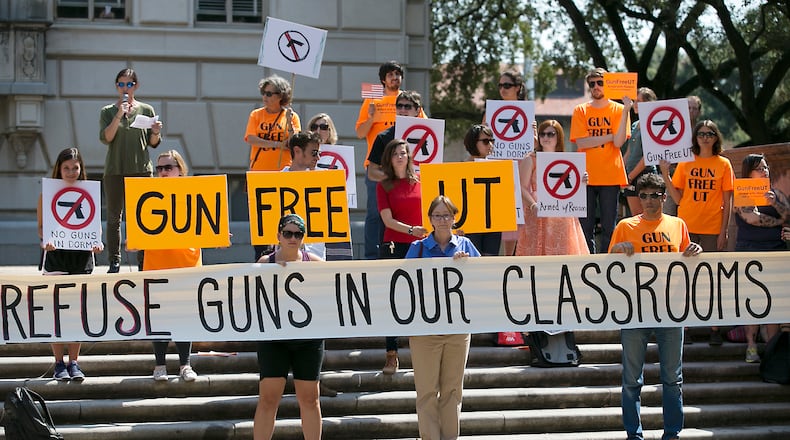In a column today, Matthew Boedy, an assistant professor of rhetoric and composition at the University of North Georgia, addresses the plan by the Georgia House to resurrect the campus carry bill in the upcoming legislative session. Gov. Nathan Deal vetoed a "campus carry" gun bill in May.
That bill, House Bill 859, would have allowed anyone who was at least 21 years old with a state-issued concealed weapons permit to carry a firearm on Georgia's public college and university campuses. The only exceptions were for on-campus dormitories, fraternity and sorority houses, and at athletic events.
House Speaker David Ralston now says legislators are preparing a new version of campus carry despite a lack of strong public support for guns on campus. A poll this summer found 56 percent of Georgians approved Deal's veto of the campus carry bill. Asked whether the Legislature should pass a campus carry bill in this upcoming session, only 37 percent of respondents said "yes."
By Matthew Boedy
Well, here we go again.
I'm not talking about Speaker David Ralston and the Georgia House writing a new "campus carry" bill, as reported by WABE.
I’m talking about the approach to this proposed policy by those who oversee the state university system and the presidents of those universities. Yes, all of them came out against House Bill 859, last year’s version of this dangerous idea was vetoed by Gov. Nathan Deal. But even with that bold political statement, there were whispers from “the top” to faculty and staff that putting up too much of a fight would alienate legislators, particularly those who write the budget.
And faculty have heard this whispering again from the new University System of Georgia Chancellor: don’t piss off legislators, particularly those still smarting from the governor’s veto.
This is not the right time for such advice. I urge the university system and its leaders to heed different voices.
First, we need to hear more from moms (and dads) who have lost children to gun violence. We need to heed the voices of members of Mother Emanuel church in Charleston. They are not calling for armed congregants in response to nine of their own being gunned down by a man trying to start a race war. Those who have lost don't want more guns, more death.
We need to remember the voice of Gov. Deal. Speaker Ralston mentioned addressing some of the more “technical” concerns raised early in the process, like protecting child care centers on campus from the presence of guns. But Gov. Deal’s veto message implied such changes would not satisfy him; he laid out a philosophical argument against the idea altogether. As legislators meet to devise their strategies for the upcoming session, I as a professor of rhetoric urge them to heed the ideals defining higher education that the governor noted. He wrote: “From the early days of our nation and state, colleges have been treated as sanctuaries of learning where firearms have not been allowed.”
It is not a contradiction to say one might be able to constitutionally carry a gun in a shopping center and be barred from carrying it across the street on a campus. It is on purpose and has been for centuries in this state. Education is fundamentally changed when guns and threats of violence – whether to secure or scare – are part of it. A ban on guns isn’t erasing anyone’s Second Amendment rights. It is balancing those rights with the right for free expression, free from threats of harm and intimidation, free from coercion and authoritarianism.
Another voice to be heeded is the faculty senates of every school in this state, who all condemn “campus carry.” Another is the American Association of University Professors, the group that represents thousands of faculty across the nation. It is against campus carry. Our local Georgia AAUP Conference, where I am a member, fully endorses the AAUP’s position. And the University System of Georgia’s official Faculty Council endorsed that position last year as well.
The AAUP noted in a 2015 statement that "college campuses are marketplaces of ideas, and a rigorous academic exchange of ideas may be chilled by the presence of weapons. Students and faculty members will not be comfortable discussing controversial subjects if they think there might be a gun in the room." This is the report we hear from Texas, where "campus carry" began in August. If you want children to learn – to think independently, to understand and empathize with different people, to lead – then I urge you to fight strongly against guns on campus.
And then listen to students. They rallied across the state in the spring against campus carry. A survey of more than 5,700 Georgia Tech students showed 70 percent do not want guns on their campus. This echoes surveys I have done with my students. They are saying no to the fear that aims to persuade us that criminals are lurking behind every corner and people who wish us harm are picking "soft targets" like campuses.
This just isn't true, according to a study published in October. Researchers aimed to determine whether concealed carry on college campuses would reduce or increase violence. According to one news report, the study found that "the vast majority of high-casualty mass shootings have happened in places where guns are allowed…" So then "policies that allow individuals to bring firearms onto college campuses are unlikely to lead to fewer mass shootings or fewer casualties from those shootings."
I too am listening to the voices of “campus carry” supporters. I have invited them to my classroom in the spring along with legislators who oppose the policy. I want students to hear both sides, and ponder the consequences.
I hope when these legislators come to my campus they will see it is one of the safest places in this state, like other campuses. And colleges are safe not merely because our police are well-trained, well-funded, and serve bravely. It is because higher education teaches us how to disarm our quarrels before they reach the level of violence. It teaches us how to argue without being threatening. It teaches us how to seek justice broadly, not impose it singularly through the barrel of a gun.
If we are to go through this debate again, let’s set the terms ourselves as those whom this policy would affect the most. It is not a debate about rights or government taking those rights. It is about learning freedom and learning freely. It is about the special place that is higher education.
About the Author
Keep Reading
The Latest
Featured



